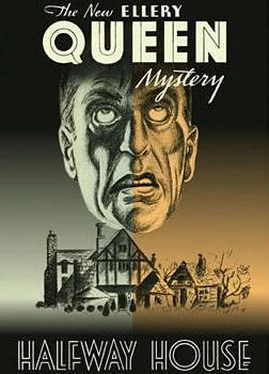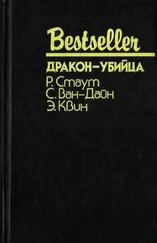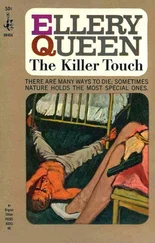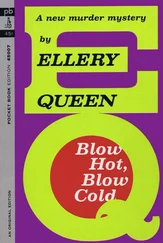The group at the third car said nothing, did nothing, nothing at all. They just stared at the body lying in the road.
“Naturally,” said Ellery on Monday morning, “although I’m a busy man I wouldn’t have missed this for the world.”
They were in Judge Ira V. Menander’s private chambers at the Mercer County Court House. Certain formalities had prevented the release of Lucy the previous day, Sunday. But this morning Bill had made a motion before Judge Menander for a new trial on the ground of “new evidence” in which Prosecutor Pollinger had automatically joined. The judge had thereupon set aside the old conviction of Lucy Wilson, Pollinger had moved to discontinue the indictment, the motion had been granted, and Bill with Andrea clinging to him had hurried across the Bridge of Sighs into the adjoining prison with an official order to the warden for Lucy’s release.
Now they were back at the old jurist’s request, Lucy quite bewildered at the suddenness of her freedom, dumb and flushed with happiness. Paul Pollinger was with them, looking sheepish.
“I have been told, Mr. Queen,” remarked Judge Menander after he had made his apologies to Lucy for the ordeal she had gone through, “that there is an extraordinary story connected with your solution of this case. I confess I’m a little curious. Yours seems to be a strange destiny, young man. I’ve heard tales about you. What magic did you perform this time?”
“Magic,” muttered Pollinger. “That’s what it was, all right.”
Ellery glanced at Bill, Lucy, Andrea; they sat on the Judge’s leather sofa with their hands joined, like three children. “Magic? For old hands, gentlemen, that’s naïve. The ancient formula: pick out the facts and put them together. Mix thoroughly with plenty of logic. Add a dash of imagination. Presto!”
“It sounds delicious,” said Judge Menander dryly, “but not very informative.”
“By the way,” said Pollinger, “how much of that little scene Saturday night was planned? I’m still sore at the way you and De Jong ignored me.”
“All of it. It was our job, anyway, Pollinger. When Andrea told me the story of the six matches, I saw through the whole fantastic business. I could develop a logical case, but none that would satisfy your damned courts of law. So it was necessary to be subtle. My criminal had to be trapped. It had been evident to me all along that one of the most curious characteristics of this criminal had been a really remarkable solicitude for Andrea. Now, if Andrea possessed knowledge dangerous to the criminal on the night of the crime due to something she saw on that table, why didn’t the criminal take her life as well as Gimball’s? Then the ‘warnings’, the dainty chloroforming! Another killer would have resorted at the last to really desperate measures against Andrea; this one was content with mere admonitions, threats made empty by the lack of force employed. So, I reasoned, if the criminal was solicitous of Andrea’s welfare, my logical plan was to put Andrea in danger.
“The best way to do this was to make it seem that I thought her guilty of the crime. The criminal could do only one of two things after this: kill Andrea to prevent her from finally disclosing the dangerous knowledge she had; or confessing to the crime to save Andrea from further complicity, which was — under the circumstances — the more plausible possibility. I didn’t believe the criminal would attempt her life because of past performances; however, I took no chances and had the teeth drawn from the criminal’s weapon. And, of course, I had De Jong and his men waiting at the place planned for the ‘breakdown’ of the ‘escape’ car, and Bill here waiting outside the shack in the car itself, hidden from sight and armed. He didn’t go to Trenton; that was just an excuse to get him out of the shack; he raced his motor while some of De Jong’s men emptied the necessary gasoline tanks and then left for the rendezvous. I had instructed Andrea beforehand in her rôle; told her just what to do in the shack and when to do it; arranged for Andrea’s and the criminal’s car to be let alone while the others were tampered with; and thereby insured the criminal’s following Andrea a little in advance of the others and providing an opportunity for the confession to Andrea.”
“Then you knew in advance who was the guilty party?” asked the prosecutor.
“Certainly. The plan could not have been concocted without that vital knowledge to build on. How would I have known whose car to let alone if I hadn’t known who killed Gimball?”
“It seems like a nightmare now,” sighed Andrea. Bill said something to her and she laid her head on his shoulder.
“Well, Mr. Queen,” said the Judge, “when am I going to hear that story?”
“If Your Honor please, right now. Where was I?” Ellery repeated for the benefit of the old gentleman and the prosecutor the reasoning he had gone through in the shack on Saturday night. “So, you see, it was evident that the six burnt matches Andrea saw before the criminal charred the cork had been used for smoking. The logical question, then, was: By whom had those six matches been used for smoking?
“On Andrea’s first visit to the shack at eight o’clock that night, there was no one in the place, and the plate on the table, she said, was quite clean and empty. At that time Gimball’s car was parked on the side driveway. When Andrea returned at eight thirty-five, the car was still there, and another car stood before the house, on the main driveway. And inside the shack the plate contained the six burnt match-stubs.
“Clearly, then, those six matches were burned in Andrea’s absence, between eight and eight thirty-five. Who was in the house during Andrea’s absence? Gimball, of course, returned to be knifed. And the evidence of the tire tracks established that the other car, the Ford, was the only car to come while Andrea was away. No one came on foot: for there were no footprints in the mud except Gimball’s. Therefore, since Gimball was killed in the interim between Andrea’s two visits, and only one car arrived in that interim, and no one came on foot, the criminal must have come in that one car. Therefore, the only ones who could have burned those six matches were Gimball and his killer.
“Now, if the six matches had been used for smoking, I could eliminate Gimball at once. He never smoked — scads of testimony and evidence to that effect. That left only the criminal.
“Theoretically, of course, it was possible that Andrea had used the six matches herself, despite what she told us to the contrary. But it was she who found the match-stubs and it was upon her story that the entire logical structure of my solution rested. If I doubted the veracity of her story I simply could not proceed. So, working on the assumption that she was telling the truth, I eliminated her. Obviously, if she came in and found those matches, then it wasn’t she who had used them.”
The old jurist’s eyes narrowed. “But, my dear Mr. Queen—”
“Yes, yes, I know,” said Ellery hastily. “Trust the judiciary to put a finger on the weakness. But it isn’t a weakness, as I shall demonstrate later. Let me go on. I knew now that the criminal had smoked in that shack before Andrea’s arrival at eight thirty-five, and had used six matches in the process. Well, what had the criminal smoked? I saw at once how important and at the same time arresting the question was.”
“Important,” smiled the judge, “but to me baffling.”
“Had the criminal smoked cigarets? Quite impossible.”
“How the deuce,” demanded Pollinger, “do you arrive at that?”
Ellery sighed. “Six half-burnt matches meant as many as six cigaret butts; cigarets scarcely ever require more than a single match. Six matches, well burnt down as they were, surely implied a multiplicity of cigarets, if cigarets were smoked. Very well. What had the smoker done with those butts? Where had they been ground out? We know that the criminal used the plate as an ashtray, for Andrea found the six burnt matches there. Wouldn’t the criminal have ground cigaret butts out in the plate as well? But Andrea saw no butts or ashes in that plate at a time when the killer could not have anticipated being interrupted and therefore would have had no reason to hide the butts elsewhere.
Читать дальше












